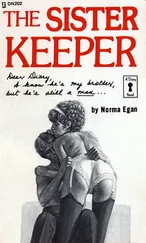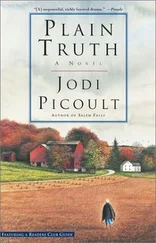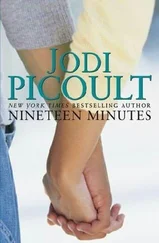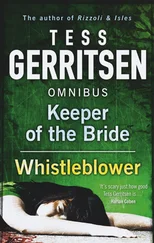"What does an ethics committee do?"
"Generally, we're called to convene when there's a discrepancy about patient care. For example, if a physician feels it's in the patient's best interests to go on with extraordinary measures, and the family doesn't—or vice versa."
"So you don't see every case that passes through a hospital?"
"No. Only when there are complaints, or if the attending physician asks for a consultation. We review the situation and make recommendations."
"Not decisions?"
"No," Dr. Bergen says.
"What if the patient complaining is a minor?" Campbell asks.
"Consent isn't necessary until age thirteen. We rely on parents to make informed choices for their children until that point."
"What if they can't?"
He blinks. "You mean if they're not physically present?"
"No. I mean if there's another agenda they're adhering to, that in some way keeps them from making choices in the best interests of that child?"
My mother stands up. "Objection," she says. "He's speculating."
"Sustained," Judge DeSalvo replies.
Without missing a beat, Campbell turns back to his witness. "Do parents control their children's health-care decisions until age eighteen?"
Well, I could answer that. Parents control everything, unless you're like Jesse and you do enough to upset them that they'd rather ignore you than pretend you actually exist.
"Legally," Dr. Bergen says. "However, once a child reaches adolescence, although they can't give formal consent, they have to agree to any hospital procedure—even if their parents have already signed off on it."
This rule, if you ask me, is like the law against jaywalking. Everyone knows you're not supposed to do it, but that doesn't actually stop you.
Dr. Bergen is still talking. "In the rare instance where a parent and an adolescent patient disagree, the ethics committee weighs several factors: whether the procedure is in the adolescent's best interests, the risk/benefit scenario, the age and maturity of the adolescent, and the argument he or she presents."
"Has the ethics committee at Providence Hospital ever met regarding the care of Kate Fitzgerald?" Campbell asks.
"On two occasions," Dr. Bergen says. "The first involved allowing her to enter a trial for peripheral blood stem cell transplant in 2002, when her bone marrow transplant and several other options had failed. The second, more recently, involved whether or not it would be in her best interests to receive a donor kidney."
"What was the outcome, Dr. Bergen?"
"We recommended that Kate Fitzgerald receive a peripheral blood stem cell transplant. As for the kidney, our group was split on that decision."
"Can you explain?"
"Several of us felt that, at this point, the patient's health care had deteriorated to a point where major invasive transplant surgery was going to do more harm than good. Others believed that without a transplant, she would still die, and therefore the benefits outweighed the risk."
"If your team was split, then who gets to decide what will ultimately happen?"
"In Kate's case, because she is still a minor, her parents."
"During either of the times that your committee met regarding Kate's medical treatment, did you discuss the risks and benefits to the donor?"
"That wasn't the issue at stake—"
"What about the consent of the donor, Anna Fitzgerald?"
Dr. Bergen looks right at me, sympathetic, which it turns out is worse even than him thinking I'm a horrible person for filing this petition in the first place. He shakes his head. "It goes without saying that no hospital in the country is going to take a kidney out of a child who doesn't want to donate it."
"So, theoretically, if Anna was fighting this decision, the case would most likely land on your desk?"
"Well—"
"Has Anna's case landed on your desk, Doctor?"
"No."
Campbell advances toward him. "Can you tell us why?"
"Because she isn't a patient."
"Really?" He pulls a stack of papers out from his briefcase, and hands them to the judge, and then to Dr. Bergen. "These are Anna Fitzgerald's hospital records at Providence Hospital for the past thirteen years. Why would there be records for her, if she wasn't a patient?"
Dr. Bergen flips through them. "She's had several invasive procedures," he admits.
Go, Campbell, I think. I am not one to believe in knights who ride in to rescue damsels in distress, but I bet it feels a little like this. "Doesn't it strike you as odd that in thirteen years, given the thickness of this file and the fact it exists in the first place, the medical ethics committee never once convened to discuss what was being done to Anna?"
"We were under the impression that donation was her wish."
"Are you telling me that if Anna had previously said she didn't want to give up lymphocytes or granulocytes or cord blood or even a bee sting kit in her backpack—the ethics committee would have acted differently?"
"I know where you're going with this, Mr. Alexander," the psychiatrist says coldly. "The problem is that this kind of medical situation hasn't existed before. There is no precedent. We're trying to feel our way as best we can.”
“Isn't your job as an ethics committee to look at situations that haven't existed before?"
"Well. Yes."
"Dr. Bergen, in your expert opinion, is it ethically right for Anna Fitzgerald to have been asked to donate parts of her own body repeatedly for thirteen years?"
"Objection!" my mother calls out. The judge strokes his chin. "I want to hear this." Dr. Bergen glances at me again. "Quite frankly, even before I knew that Anna didn't want to be a participant, I voted against her donating a kidney to her sister. I don't believe Kate would live through the transplant, and therefore Anna would undergo a serious operation for no reason at all. Up until this point, however, I think that the risk of the procedures was small, compared to the benefit the family as a whole received, and I support the choices the Fitzgeralds made for Anna."
Campbell pretends to consider this. "Dr. Bergen, what kind of car do you drive?"
"A Porsche."
"Bet you like it."
"I do," he says guardedly.
"What if I told you that you have to give up your Porsche before you leave this courtroom, because that action will save Judge DeSalvo's life?"
"That's ridiculous. You—"
Campbell leans in. "What if you had no choice? What if, today, psychiatrists simply have to do whatever lawyers decide is in the best interests of others?"
He rolls his eyes. "In spite of the high drama you're alluding to, Mr. Alexander, there are basic donor rights, safeguards put into place in medicine, so that the greater good doesn't steamroll the pioneers who help create it. The United States has a long and nasty history of the abuse of informed consent, which is what led to laws relating to Human Subjects Research. It keeps people from being used as experimental lab rats."
"Then tell us," Campbell says, "how the hell did Anna Fitzgerald slip through the cracks?"
When I was only seven months old, there was a block party in our neighborhood. It's just as bad as you're thinking: Jell-O molds and towers of cheese cubes and dancing in the street to music piped out of someone's living room stereo. I, of course, have no personal recollection of any of this—I was plopped down in one of those walkers they made for babies before babies started overturning them and cracking their heads open.
At any rate, I was in my walker, tooling around between the tables and watching the other kids, so the story goes, when I sort of lost my footing. Our block is canted at an angle, and suddenly the wheels were moving faster than I could make them stop. I whizzed past adults, under the barricade the cops had put up at the end of the road to shut it off to traffic, and I was heading right for a main drag full of cars.
Читать дальше












